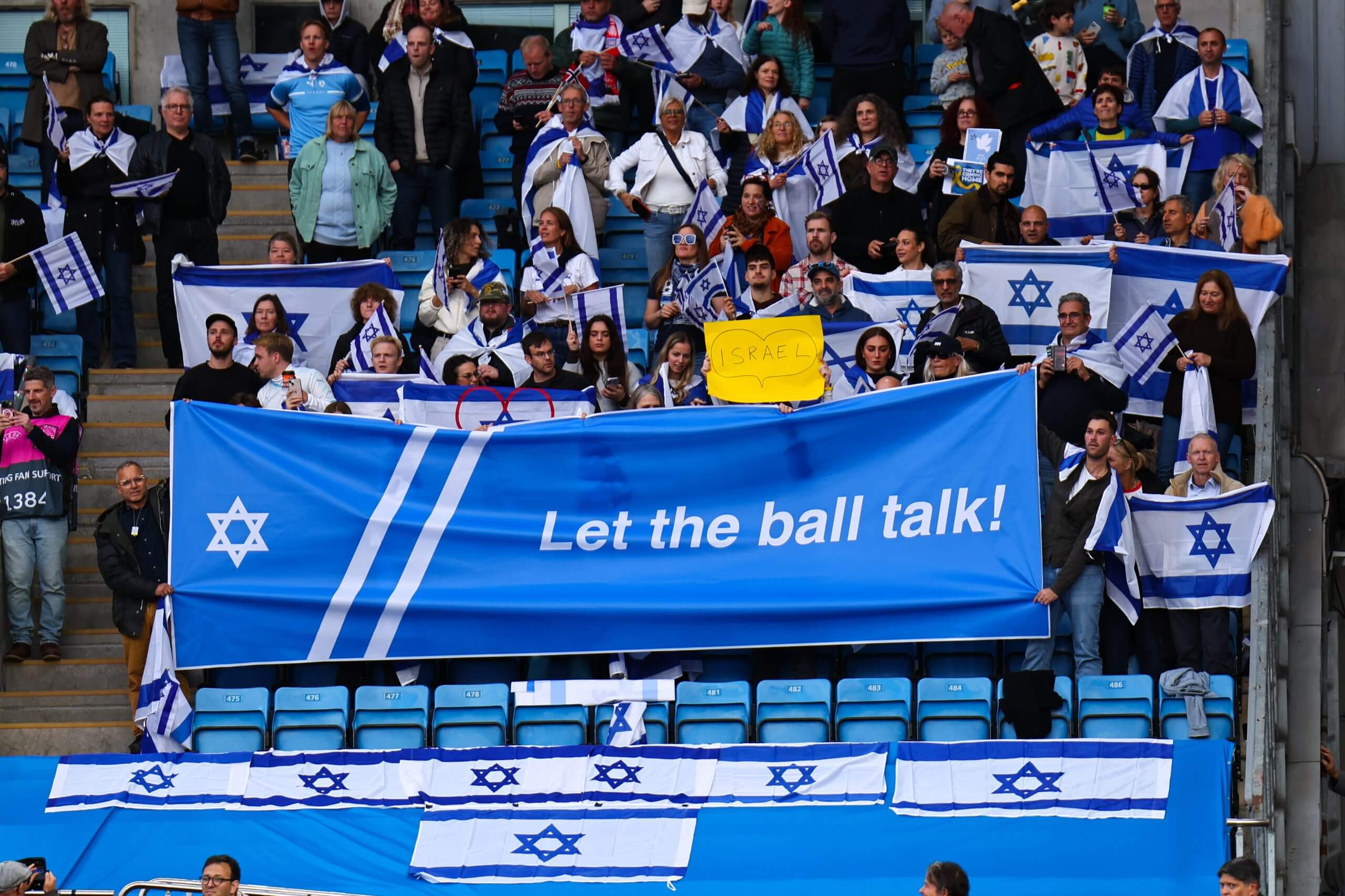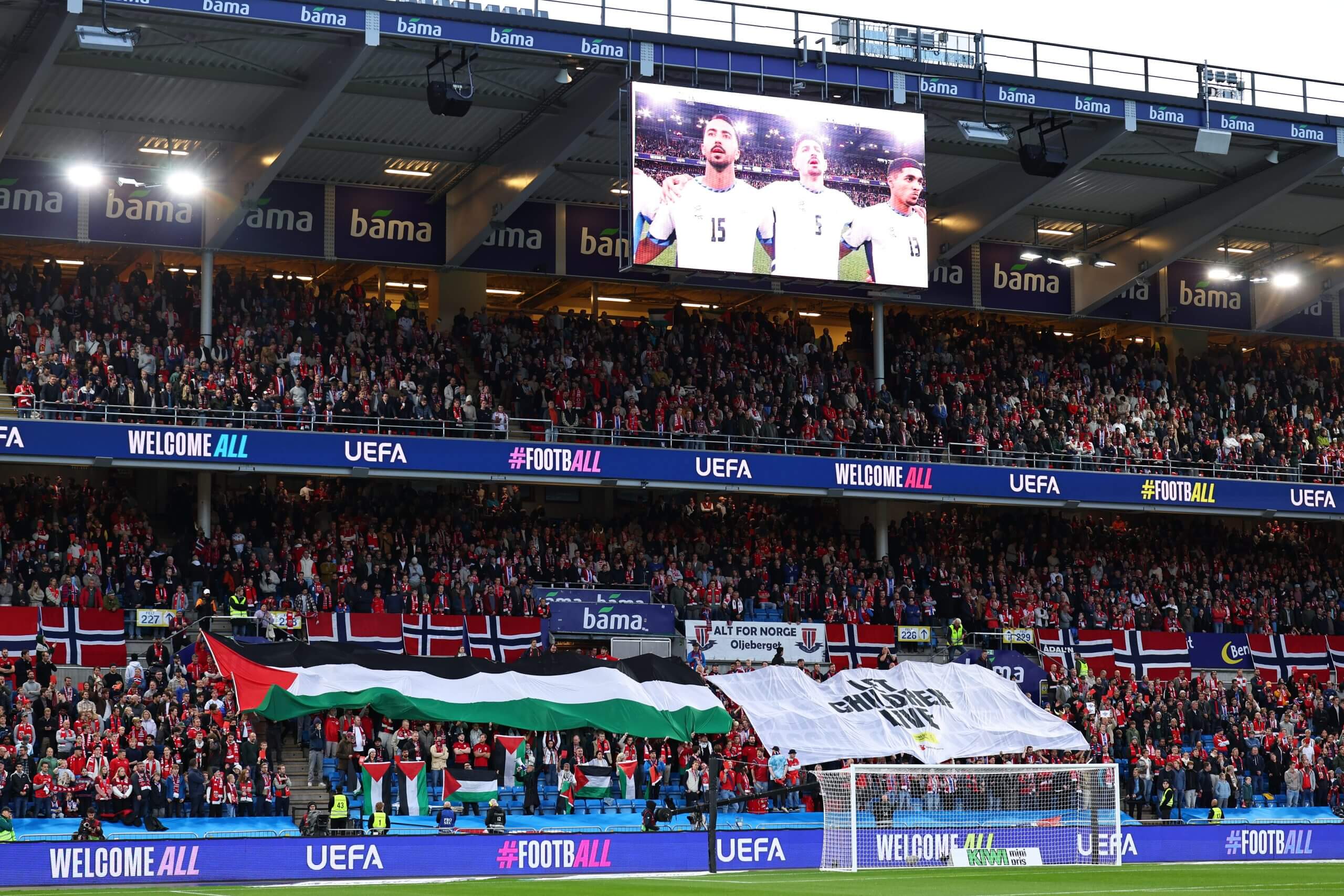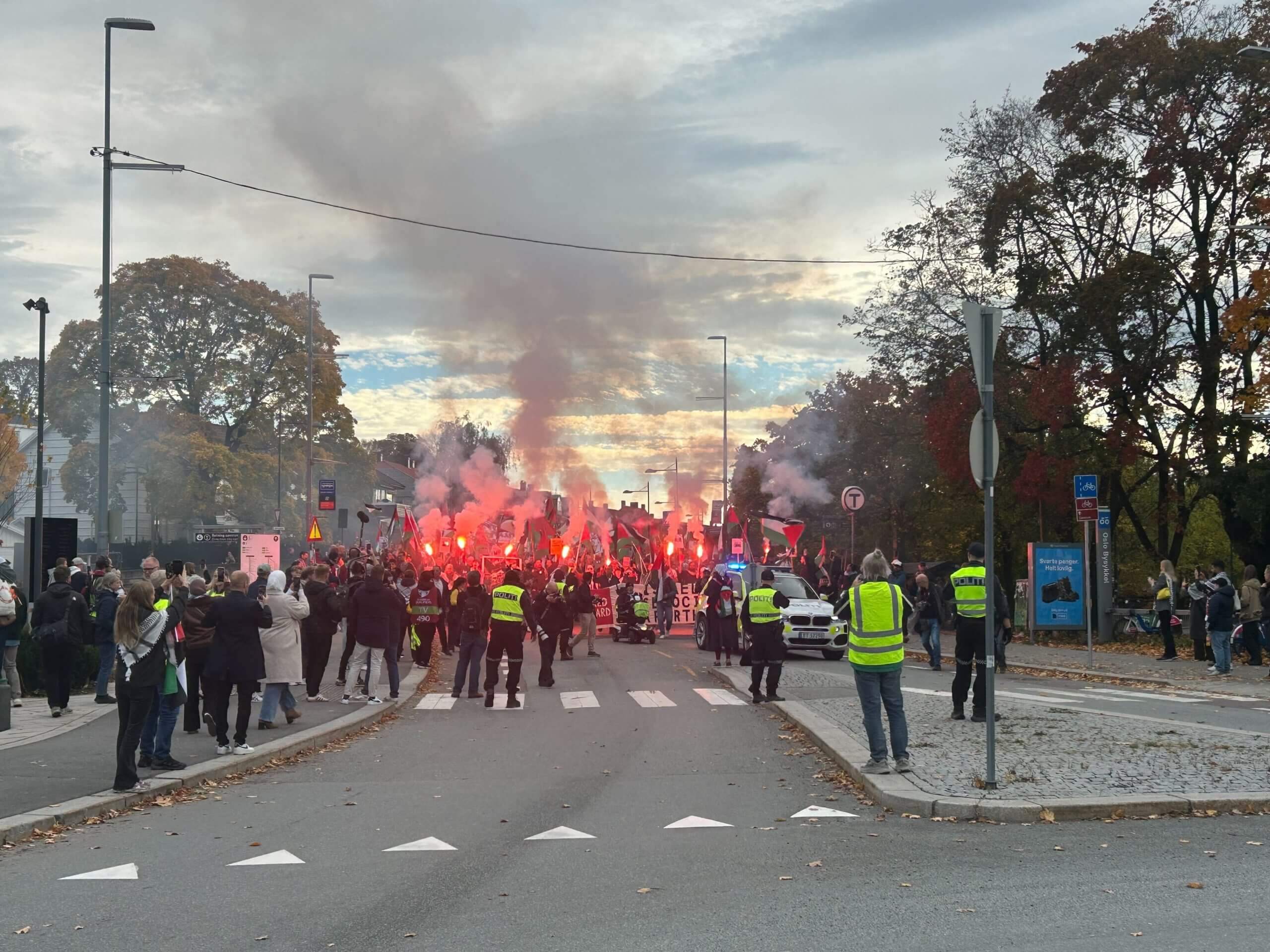On the eve of Norway hosting Israel, it had been the wish of the visiting captain Eli Dasa that the international gaze could be drawn back to World Cup qualification in Oslo.
“Football should not involve politics,” Dasa told reporters in a pre-match press conference. “Never. It doesn’t matter if it’s Israel or another country. Football needs to use the power it has to unite people.”
Israel’s travelling supporters, numbering roughly 100, inside the Ullevaal Stadion on Saturday evening, had similar hopes. “Let the ball talk!” said a banner held up as the two teams emerged.
At the opposite end of the ground, though, they will have seen a refusal to comply.
A giant Palestine flag was unfurled by Norway’s supporters ahead of kick-off, along with another large crowd surfer. “Let children live,” it simply read. Many jeered and whistled Israel’s national anthem, too, holding aloft more Palestinian flags and red cards.

Israel fans hold up a ‘Let the ball talk!’ banner (Robbie Jay Barratt – AMA/Getty Images)
The reception lacked the hostility of the protest march that had concluded 100 yards outside of the Ullevaal, an organised demonstration that would later see a small number of people arrested, but it was a sporting occasion where Israel’s role in the Gaza conflict seeped through.
Chants of “Free Palestine” could even be heard from a small section of fans in the closing stages of Norway’s emphatic 5-0 victory, where Israel found themselves ruthlessly pulled apart by an opponent that had Erling Haaland flourishing at its tip.
The striker’s hat-trick ought to have been more after two early penalties were missed.

A Palestine flag and ‘Let Children Live’ banner are unfurled during the anthems (Robbie Jay Barratt – AMA/Getty Images)
The emphatic result likely ends Israel’s faint hope of reaching next summer’s World Cup finals in the U.S., Canada and Mexico but, at the end of a week that has opened the door to peace with a ceasefire brokered for Gaza, there was an eagerness to look for broader pictures.
“We have a big role in Israeli society, we have to stay together,” said Israel’s head coach Ran Ben Shimon afterwards. “I believe the national team of Israel, and other national teams, have a bigger perspective than football.”
Forty-eight hours in Oslo had underlined as much.
This was no ordinary World Cup qualifier. One nation’s discomfort in hosting another had been clear since the qualification draw was made last December and an enormous security operation was deemed necessary across Oslo. Not since the Winter Olympics were hosted in 1994, they said, has Norway known measures like it around a sporting event.
The Norwegian Football Federation’s (NFF) general secretary Karl-Petter Loken said “almost a year” had been spent finalising plans that included a reduction of capacity by 2,500. Tarpaulin was placed over the front three rows of seats in the lower bowl in an attempt to stop spectators entering the pitch. Seating directly above the small Israel section also remained empty.
Loken had urged fans to be respectful in an address held in the Solskjaer Lounge of the Ullevaal on Friday afternoon but it was the voice of Lise Klaveness, the NFF’s president and UEFA Executive Committee member, that carried greater weight in the build-up.
She had made no secret of her belief that Israel ought to have been suspended by UEFA and FIFA and received a hostile line of questioning from Israeli journalists in the room. There were accusations of hypocrisy and a poor understanding of the trauma that Israelis had suffered on October 7, 2023. Klaveness was asked to condemn the attacks led by Hamas, which saw around 1,200 people killed and 250 taken hostage, despite repeatedly doing so.

NFF president and UEFA Executive Committee member Klaveness speaking on Friday (FREDRIK VARFJELL/NTB/AFP via Getty Images)
The NFF’s decision to give all profits from ticket sales to Doctors Without Borders, the independent humanitarian aid body working in Gaza, also drew scrutiny.
“We have learned over the weeks that it has been a provocation, which is 100 per cent not the intention,” Klavneness told reporters. “We wanted people to come and cheer for Norway in an important game but at the same time give money to humanitarian causes. Although we condemn the horrific attacks on October 7, 2023 on Israeli civilians, they don’t need financial aid from Norway.”
Klaveness also denied she had been part of any movement that threatened to see Israel banned by UEFA in the weeks leading up to their arrival in Oslo.
There had been “momentum”, she said, but was unable to say how close it had come on the back of a United Nations commission of inquiry saying Israel had committed genocide against Palestinians in Gaza, findings rejected by Israel. The Hamas-led health ministry says that 67,000 people have now been killed in Gaza.
“Everybody observed there was a movement in Europe and I think everyone understands it’s not a Norwegian initiative,” she said. “I honestly don’t know about the momentum but it happened and it did not come from us.”
She later added: “For Norway, it’s never been an aim to ban or boycott anyone, but to work consistently in (FIFA’s) rules.”
Israel FA’s, though, had been stung by the stance of their Norwegian counterparts. A social media post on the morning of the game imposed two Israel flags on the side of the Ullevaal Stadion. “Especially today and especially there,” its accompanying words read. “Proud to represent the blue and white.”
Israel had a good idea what would be awaiting them. A demonstration had been organised by the Palestine Committee in Norway weeks in advance of the game and was unaffected by the breakthrough in peace talks between Hamas and Israel this week.
A 2pm gathering at the Spikersuppa in Oslo’s city centre came shortly before the Norwegian parliament had been reopened nearby, with Norway’s King Harald V driven up Karl Johans Gate in a classic convertible car, but the sentiment held towards Israel was much less warm. Placards of civilians killed in Gaza were handed out, along with red cards to illustrate that clear alignment with Klaveness.
It took just over an hour for the march north of almost three miles to reach the Ullevaal in Oslo’s suburbs, with flares ignited to mark their arrival of over 1,000 people at a designated area just outside the stadium’s footprint, where a stage had been erected for rallying speeches and chanting.

Protesters from the city centre arrive at the edge of the stadium footprint before kick-off (Phil Buckingham – The Athletic)
Israel’s team coach, by this time, had arrived behind high metal barriers. Dasa had been asked the day before if he had experienced such an unusual reception that had included a small protest as Israel trained the previous evening. “Unusual for who?” he replied. “For us it’s quite normal.”
The high police presence, with a handful of riot vans positioned between the protestors and the stadium entrance, quelled any threat of violence until a small flashpoint close to half-time. Tear gas was briefly used to disperse activists who attempted to break through police barricades.

Tear gas used outside the Ullevaal Stadium (JAVAD PARSA/NTB/AFP via Getty Images)
Israel’s qualification hopes, by that stage, were as good as over. Despite Haaland having two penalties saved by Israel goalkeeper Daniel Peretz, including one that was ordered to be retaken due to encroachment, a clinical finish from the Manchester City forward in between two own goals from Anan Khalaili and Idan Nachmias had built up an unassailable lead inside the opening half hour.
The other notable incident of the first half was one person overcoming the tight security measures to reach the pitch. He was later identified as a self-publicist rather than protestor, and the boos that greeted his entry underlined that most fans had not wished for distractions on a night of high footballing stakes.
Norway’s eventual 5-0 victory, with two Haaland headers completing another hat-trick in the second half, was a just outcome for an Israel team beset by openness and poor organisation. A defeat to Italy in Udine on Tuesday night will confirm this to be another qualification campaign that falls short.
There was time for some final jeers from home supporters even after the full-time whistle as Israel’s players thanked their small pocket of fans but this was a team now beginning to consider what comes next. Ben Shimon has spoken of his “dream” of Israel returning to home soil for the first time since 2023 when qualification begins for Euro 2028.
Klaveness, too, had earlier voiced her happiness in the promise of peace. “It’s more important than the game, 100 per cent, that the bombs stop and the hostages come home,” she said.
That prospect has moved closer than ever before in the last seven days, but Norway told the world again that its alliance is with the people of Palestine.

